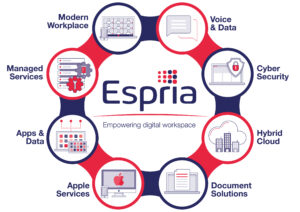Technological evolution is inevitable. Never more so than pre and post pandemic.
Our teams no longer are tied to the office as a result of access to the cloud, meaning that work is flexible and accessible wherever you are.
As a result, there has been an increase in incredible communication tools supporting every touchpoint of your business, however, all of these can be overwhelming for any IT team to deal with.
However, Unified Communications has become the answer to business operations and that is becoming the answer for businesses to remain operationally fluid.
What is Unified Communications?
Unified Communications combines a wealth of communication tools allowing a level of seamless communication not seen before that allows you to work anywhere within a highly secure platform.
Unified Communications, or UC, describes how we connect to different communication systems for the digital workforce including :
- Instant Chat
- Voice and Video calling
- File sharing
- Integrated apps

What are the benefits of Unified Communications?
- Great Productivity: Connect anywhere on any device your teams choose and access all the collaborative tools to make your business operations seamless and highly effective.
- High Performing Teams: All teams can communicate, collaborate and solve their and your customers queries or issues quicker, supporting your business reputation.
- Reduced Costs: As it’s the cloud, there are fewer initial expenses with no heavy upfront costs for hardware.
- Superior User Experience: Unified Communications supports flexible working for today’s workplace and enables your teams to have ease of use to perform their jobs effectively.
What are the trends driving Unified Communication?
Unified Communications has grown in popularity over recent years. Research conducted by Statista (https://www.statista.com/statistics/1125737/unified-communications-and-collaboration-market/#:~:text=The%20global%20unified%20communications%20%26%20collaboration,almost%2050%20billion%20U.S.%20dollars.) in February of this year concluded that: “The global unified communications & collaboration market grew by more than 29 percent in 2020 compared to 2019 and reached a size of 47.2 billion U.S. dollars in 2020. The unified communications & collaboration market is set to further grow over the next few years to almost 50 billion U.S. dollars. Due to the COVID-19 pandemic in 2020 many organizations had to send their employees home to work remotely. Unified communication and collaboration tools enabled this hybrid workforce to stay connected.” The rise of the digital workforce has driven and accelerated the use of Unified Communications due to the fact that people want to be able to perform their jobs wherever they might be, combine that with the move to many applications to the cloud for businesses to remain agile, then your working environment is primed for success. Unified Communications provides better connections and productivity for all employees. Mode are experts at Unified Communications and supporting your teams with your business digital transformation. For more information, why not take a look at our website: https://www.espria.com/services/voice-and-networks/unified-communications/

